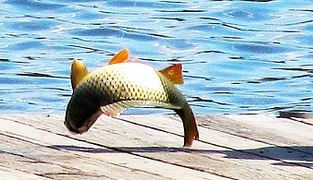Podcast: Play in new window | Download
Subscribe: RSS
I kept trying to stay focused while watching Sunday night’s NBA Eastern Conference Game 7 between the Boston Celtics and Miami Heat. As a long-time Celtics fan, I was obviously pulling for the C’s but wanted to watch a competitive game played by today’s highly skilled athletes.
Though the Celtics prevailed 100-96 (nearly blowing a big lead in the final two minutes), this game was no masterpiece. The players were hitting the floor with so much regularity that the NBA should have dispatched a doctor to each bench to assist the (cough, cough) injured during nearly every time out.
The players in Game 7 weren’t taking lumps because of the amount of vicious elbows (OK, there were a few) or hard fouls committed to prevent an easy score (there were a few of those, too). Those types of plays should be expected in the final game to decide which team would face the Golden State Warriors in the NBA Finals coming up on Thursday.
It was incredible the number of times which these gifted basketball players fell to the floor on Sunday evening after taking a shot or attempting to prevent another player from taking a shot.
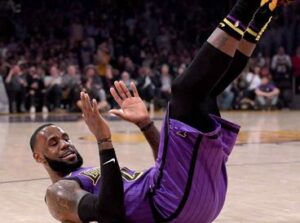
Though a few of the floor burns may have been attributable to hard play, the vast majority of the falls came from overacting.
Jimmy Butler, Miami’s primary scorer, goes 6’7” and weighs 230 pounds. If you watched Butler play during Sunday’s Game 7 finale against Boston, the big fellow was hitting the hardwood after nearly every shot attempt.
Either the Celtics were pushing him around a like a ragdoll or Butler has a very bright future in Hollywood after such a persuasive acting performance in Game 7!

Since doctors weren’t being summoned to the floor to attend to Jimmy Butler, his flopping performance Sunday night was definitely All-Star caliber. Time after time, this talented and very coordinated basketball player came crashing down to the floor with hopes of hearing the referees (who did a horrible job during this series) blow a whistle to award the player with one or more free throw attempts for his efforts.
The NBA officially calls this a “flop”. It’s simply a big fake.
The rewards usually include having an undeserved foul being called on an opposing player with one or more free throws then awarded to the actor/player for his outstanding acting performance.
NBA flopping (which has been on the rise for more than two decades) has now become a basketball pandemic. You’re also starting to see it happen more in college games, too.
Once you start to reward bad behavior, you should expect to see more of it.
By the way, Miami isn’t alone in having a few truly outstanding NBA floppers.
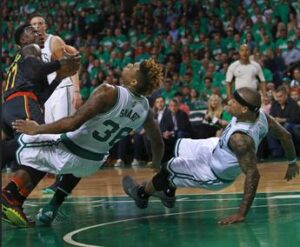
The Boston Celtics (led by All-NBA flopping guard Marcus Smart) left their share of wet spots and dents on the hardwood of Miami’s basketball arena Sunday night, too. Marcus Smart is 6’4” and weighs in at a very solid 220 pounds. Yet, time after time, the Celtics point guard seemed to be easily toppled to the floor on nearly every shot attempt.
These actors have become so convincing that they can create an illusion that a little old lady sitting in the first row might be able bring one of these giant players down.
Let’s head to the NBA rule book for more information on the consequences of flopping:
“A ‘flop’ is an attempt to either fool referees into calling undeserved fouls or fool fans into thinking the referees missed a foul call by exaggerating the effect of contact with an opposing player.
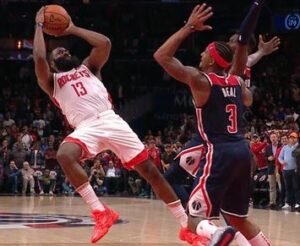
The main factor in determining whether a player committed a flop is whether his physical reaction to contact with another player is inconsistent with what would have been expected given the force or direction of the contact. For example, a player will be considered to have committed a “flop” if he falls to the floor following minimal contact or lunges in a direction different from the direction of the contact.
The determination of whether a player has violated the flopping rule will be made by the League following video review of the play. (Game officials will not make determinations about flopping during games.)”
For the record, the faking of fouls and injuries serves to minimize the impact of actual hard fouls, abrasions and cuts which players receive from time to time. Crying “wolf” can work against the players when a real dirty play actually occurs.
This rule was instituted in 2012. The NBA would not have placed this into their rule book if it wasn’t already a big problem.
Alas, this rule is not being enforced! Statistics from the NBA’s 2021-2022 regular season indicate that not one NBA player in the 30-team league had been penalized for flopping.
Over this past season, the NBA doled out over $35 million in fines – mostly for technical fouls. Yet there wasn’t a single mention about any fines levied to players for flopping.
That’s because today’s NBA referees are not calling the overwhelming majority of these acting jobs by the players.
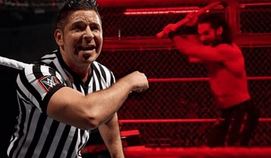
Though a few NBA referees may be eyeing a future career in the WWE for turning blindly turning away at the worst possible time, there is a more practical reason why the flopping rule isn’t being whistled.
The NBA (which is desperately trying to regain its fans) is trying to avoid lengthening games.
A few decades ago, basketball games were routinely completed in 2 hours. After several new television deals have caused broadcast rights to skyrocket, the league’s games now routinely take 2 ½ to up to 3 hours to play. The networks have been inserting more commercial minutes to recoup their costs, but fans don’t want three minute TV timeouts and twenty minute halftime breaks.
So, if NBA referees started to take a little time to review and call every possible flopping violation, the league’s games will take even longer to conclude.
Then, there’s also the issue of punishment. Here’s what is currently on the books for flopping violations in today’s NBA:
“The first time a player is determined to have committed a flop, he will be warned by the NBA. Thereafter, the following automatic penalties will apply:
Violation 2: $5,000 fine
Violation 3: $10,000 fine
Violation 4: $15,000 fine
Violation 5: $30,000 fine
For a sixth (or any subsequent) violation of the rule, the player will be subject to such discipline as the League determines is reasonable under the circumstances, including an increased fine and/or suspension.”
Does anyone seriously believe that this level of punishment will stop NBA players who are (on average) being paid an average of $10 million per season?
How about this idea? The accused NBA flopper should be fined the maximum on the first offense. That’s a cool $30,000 (with, perhaps, the proceeds going to a local drama school?). The second offense in a season means a one week suspension without pay. The third offense in a season would result in a player’s disqualification (without pay) for the remainder of the regular season and playoffs.
By having a more serious “Three flops and you’re out” rule, the NBA would put an end to this nonsense immediately.
Congratulations to the Boston Celtics on their first trip to the NBA Finals in a decade. They will now face the Golden State Warriors Thursday night in San Francisco in Game 1 of the NBA’s best-of-seven game final series.
By the way, if you thought the NBA’s Eastern Conference had some quality floppers, wait until you see a couple of the Western Conference top floppers Draymond Green and Steph Curry in action!
Sigh.
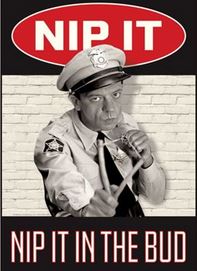
As Mayberry Deputy Barney Fife would say, “It’s time to NIP IT! Nip it in the bud!”

